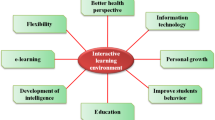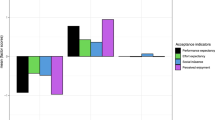Abstract
Studies that examine the attitudes toward information and communication technologies (ICT) among physical education and sport students, pre-service teachers and teachers are fairly limited, even though the investments in information and communication technologies at schools and universities have reached an efficient level. This study investigates the attitudes of physical education and sport students and pre-service teachers towards ICT, and the relationship between their attitudes and certain variables such as age, gender, departments, computer familiarity, frequency of computer use and computer ownership. Computer attitude scales were administered to 337 students and pre-service teachers of physical education and sports, and the data collected were analyzed statistically. It was found that the students and pre-service teachers of physical education and sports have positive attitudes toward information and communication technologies, and there are significant correlations between their attitudes and certain variables such as gender, grade, computer ownership, and computer instruction. Recommendations are provided.
Similar content being viewed by others
References
Akkoyunlu, B., Tuğrul, B. (2002). Okul öncesi çocuklarının ev yaşantısındaki teknolojik etkileşimlerinin bilgisayar okuryazarlığı becerileri üzerindeki etkisi [The effect of preschool children’s technological interactions at home on their computer literacy skills]. Hacettepe Üniversitesi Eğitim Fakültesi Dergisi, 23, 12-21.
Aktümen, M., Kaçar, A. (2003). İlköğretim 8. sınıflarda harfli ifadelerle işlemlerin öğretiminde bilgisayar destekli öğretimin rolü ve bilgisayar destekli öğretim üzerine öğrenci görüşlerinin değerlendirilmesi [The role of computer-assisted teaching in the instruction of statements in letters and operations among 8th-grade primary school students and an evaluation of student opinions about computer-assisted teaching]. Kastamonu Eğitim Dergisi, 2, 339-358.
Aral, N., Bütün-Ayhan, A., Ünlü, Ö., Erdoğan, N., and Unal, N. (2006). Anaokulu ve anasınıfı öğretmenlerinin bilgisayara yönelik tutumlarının incelenmesi [Determining the attitudes of preschool and kindergarden teachers towards computers], Elektronik Sosyal Bilimler, 5(17), 25-32. Retrieved from: http://www.e-sosder.com/dergi/1725-32.pdf
Aydin, S. (2007). Attitudes of EFL learners towards the Internet. The Turkish Online Journal of Educational Technology – TOJET, 6 (3), 18 – 26.
Bebetsos, E and Antoniou, P. (2009). Gender differences on attitudes, computer use and physical activity among Greek university students, The Turkish Online Journal of Educational Technology – TOJET April 2009 ISSN: 1303-6521 volume 8 Issue 2 Article 6
Cooper, J. R. (1998). A multidimensional approach to the adoption of innovation. Management Decision, 36(8), 493–502.
Commission of European Communities (2000). Communication from the commission: e-Learning-designing tomorrow’s education. Brussels, 24. 5. 2000, 318 final. Retrieved from: http://ec.europa.eu/education/archive/elearning/comen.pdf
Eurydice. (2001). ICT@Europe.edu: Information and communication technology in European education systems. Eurydice: the information network on education in Europe. etrieved from: http://www.mszs.si/eurydice/pub/eurydice/ICTpdf
Hartley, K. and Bendixen, L. D. (2001). Educational research in Internet age: examining the role of individual characteristics. Educational Researcher, 30(9), 22-26.
Hakkarainen, K., Ilomaki, L., Lipponen, L., Muukonen, H., Rahikainen. M., and Tuominen, T.(2000). Students’ skills and practices of using ICT: results of a national assessment in Finland. Computers and Education, 34, 103-117.
Hong, K-S. and Koh, C. K., (2002). Computer anxiety and attitudes towards computers among rural secondary school teachers: A Malaysian Perspective. Journal of Research on Technology on Education, 35(1), 27-48.
İşman, A., Evirgen, H. and Çengel, M. (2008). Sakarya ili milli eğitim müdürlüğünde çalışan öğretmenlerin internet kullanma bariyerleri [The barriers of Internet use of the teachers employed in the directorate of national education in Sakarya]. 8th International Educational Technology Conference Proceedings. Retrieved from: http://ietc2008.home.anadolu.edu.tr/ietc2008/29.doc
Kocak, S. (2003). Computer attitudes and competencies in physical education and sport. International Council for Health, Physical Education, Recreation, Sport and Dance, 39(1), 49–52.
Kozma, R. B. (ed.) (2003). Technology, innovation, and educational change: A global perspective. Eugene, OR: International Society for Technology in Education.
Lee, R. (1970). Social attitudes and the computer revolution. Public Opinion Quarterly, 34(1), 53–59.
Li, N. and Kirkup, G. (2007). Gender and cultural differences in Internet use: A study of China and the UK. Computers and Education, 48, 301–317.
Lim, C.P., and Khine, M. S. (2006). Managing teachers’ barriers to ICT integration in Singapore schools. Journal of Technology and Teacher Education, (14)1, 97-125.
Ministery of National Education (MNE) (2002). Education statistics of 2002 year. Retrieved from: http://www.meb.gov.tr/stats/apk2002/61.htm
Ministry of National Education (MNE) (2008a). The project of Internet access (Internet erişim projesi). Retrieved from: http://www.meb.gov.tr/ADSL/adsl_index.html
Ministry of National Education (MNE) (2008b). Education statistics. Retrieved on October 15, 2008 from: http://www.meb.gov.tr
Palaigeorgiou, G. E., Siozos, P. D., Konstantakis, N. I., and Tsoukalas, I. A. (2005). A computer attitude scale for computer science freshmen and its educational implications. Journal of Computer Assisted Learning, 21(5), 330–342.
Papanastasiou, E. C., and Angeli, C. (2008). Evaluating the use of ICTs in education: psychometric properties of the survey of factors affecting teachers teaching with technology (SFA-T3). Educational Technology and Society, 11 (1), 69-86.
Papastergiou, M., and Solomonidou, C. (2005). Gender issues in Internet access and favourite Internet activities among Greek high school pupils inside and outside school, Computers and Education, 44, 377–393.
Paraskeva, F., Bouta, H., and Papagianni, A. (2008). Individual characteristics and computer self-efficacy in secondary education teachers to integrate technology in educational practice. Computers and Education, 50, 1084–1091.
Schug, M.C. (1988).What Do Social Studies Teachers Say About Using Computers? In The Social Studies. 112-115.
Selwyn, N. (1999). Students’ attitudes towards computers in sixteen to nineteen education. Education and Information Technologies, 4(2), 129–141.
Smerdon, B., Cronen, S., Lanahan, L., Anderson, J., Iannotti, N, and Angeles, J. (2000). Teachers’ tools for the 21st century: A report on teachers’ use of technology. Statistical Analysis Report. (ERIC Document Reproduction Service No. ED 444 599).
Smith, B., Caputi, P., and Rawstorne, P. (2000). Differentiating computer experience and attitudes toward computers: An empirical investigation. Computers in Human Behavior, 16(1), 59–81.
State Institute of Statistic (SIS) (2008). ICT usage survey on household and individuals 2008. Information Bulletin, 138. Retrieved from: http://www.tuik.gov.tr/PreTablo.do?tb_id=60andust_id=2
State Planning Organization (SPO) (2006). Information society strategy 2006-2010. Ankara: State Planning Organization. Retrieved from: http://www.bilgitoplumu.gov.tr/eng/docs/Information%20Society%20Strategy_Turkey.pdf
State Planning Organization (SPO) (2008). OECD-IT Policy Questionnaire 2008-Turkey. Retrieved from: http://www.bilgitoplumu.gov.tr/yayinlar.asp.
Teo, T., Chai, C. S., Hung, D., and Lee, C. B. (2008a). Beliefs about teaching and uses of technology among pre- service teachers. Asia Pacific Journal of Teacher Education, 36(2), 165-176.
Teo, T., Lee, C.B., and Chai, C. S. (2008b). Understanding pre-service teachers’ computer attitudes: Applying and extending the Technology Acceptance Model (TAM). Journal of Computer-Assisted Learning, 24, 128–143.
Thomas, A., and Stratton, G. (2006). What we are really doing with ICT in physical education: A national audit of equipment, use, teacher attitudes, support, and training. British Journal of Educational Technology, 37(4), 617-632.
Tondeur, J., van Braak, J. and Valcke, M. (2007). Curricula and the use of ICT in education: Two worlds apart. British Journal of Educational Technology, 38(6), 962-976.
Varol, A. (1999) “Bilişim alanindaki eğitimcilerin eğitimi” [Educating the educators in the information field], btie’99, bilişim teknolojileri işiğinda eğitim konferansi ve sergisi [A conference and exhibition on education in the light of information technologies], 13-15 May 1999, Bildiriler Kitabı, S:99-104, Ankara.
Yaman, M. (2007) The attitudes of the physical education students towards The Internet, The Turkish Online Journal of Educational Technology - TOJET July 2007 ISSN: 1303-6521 Volume 6, Issue 3, Article 8.
The World Bank (2007). 2007 world development indicator. Washington, D.C.: The World Bank. Retrieved from: http://www.worldeconomy.org.cn/UploadFiles/2008351252658.pdf.
Author information
Authors and Affiliations
Rights and permissions
About this article
Cite this article
Goktas, Z. The Attitudes of Physical Education and Sport Students towards Information and Communication Technologies. TECHTRENDS TECH TRENDS 56, 22–30 (2012). https://doi.org/10.1007/s11528-012-0560-x
Published:
Issue Date:
DOI: https://doi.org/10.1007/s11528-012-0560-x




